How to Stop Late Night Snacking for Good
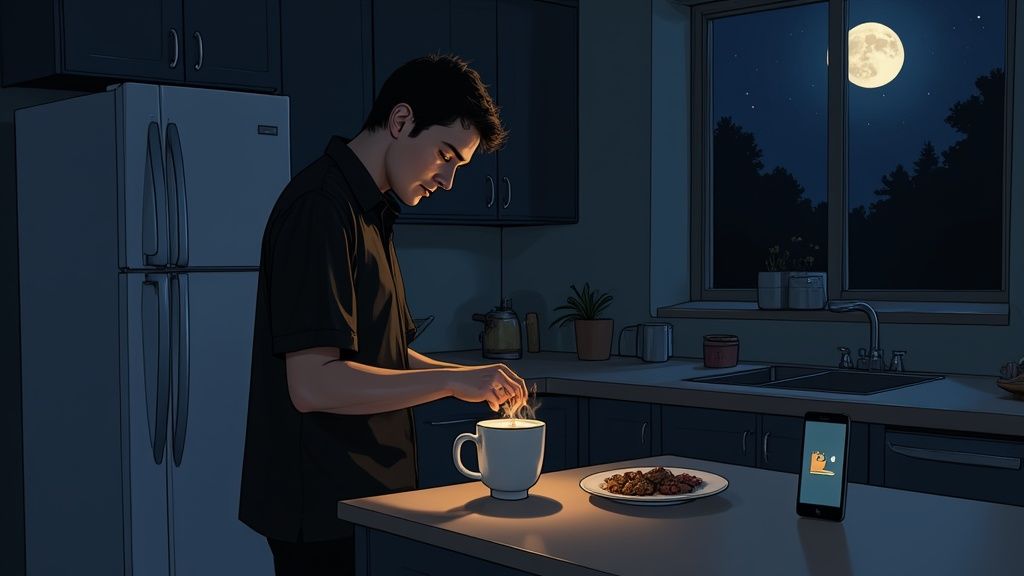
If you want to finally put a stop to late-night snacking, you need to get to the root of the problem. It's rarely about true hunger. More often, it’s a response to boredom, stress, or just a deeply ingrained habit.
The secret isn't about white-knuckling your way through cravings. It’s about being smart and restructuring your routines to tackle those triggers head-on. This means eating balanced meals during the day, creating a relaxing evening wind-down, and having healthier options ready if you are genuinely hungry. It's a shift from a battle of willpower to a strategy of proactive planning.
So, Why Are You Really Snacking at Night?
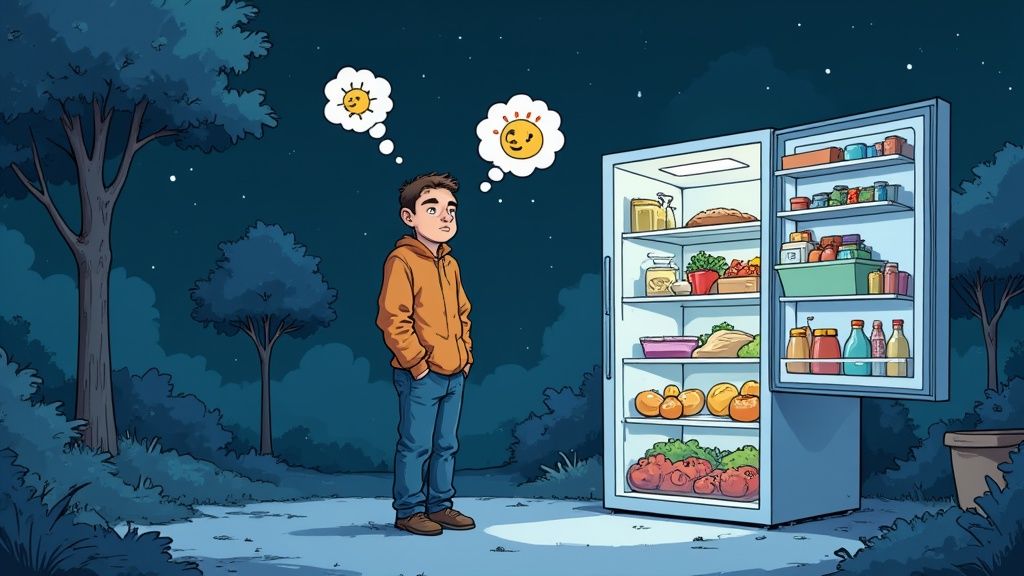
Let's be real. That 10 p.m. raid on the pantry probably isn't about fueling your body. For most of us, it’s a comforting ritual at the end of a long day—a way to unwind and treat ourselves.
Our modern lifestyles have only made this worse. Recent research shows that nearly half of consumers blame lifestyle shifts like irregular work schedules and working from home for their increased nightly snacking. Stress and the need for emotional comfort are huge drivers, too, pushing us toward sugary or salty snacks for that quick dopamine hit.
The first step to breaking this cycle isn't about simply resisting the urge. It’s about getting curious and understanding it. Once you figure out why you're reaching for that snack, you can address the actual problem instead of just fighting the symptom.
Identifying Your Late Night Snacking Triggers
Use this table to pinpoint what's driving your late-night snacking. Recognizing your pattern is the first step to changing it.
| Trigger Type | Common Examples | A Quick Solution to Try Tonight |
|---|---|---|
| Emotional | Feeling stressed after a tough day at work; feeling lonely or bored. | Instead of eating, try a 5-minute guided meditation or listen to a calming playlist. |
| Habitual | Always eating a bowl of ice cream while watching your favorite show. | Change the channel! Or, at least, change your seat. Break the physical routine. |
| Environmental | Seeing a bag of chips left out on the counter. | Keep tempting snacks out of sight. Put them in an opaque container on a high shelf. |
| Physical | You skipped lunch or didn't eat a filling dinner. | Drink a large glass of water first. If still hungry, have a pre-planned healthy snack. |
Recognizing your personal triggers is the most powerful tool you have. Once you know what they are, you can start building a smarter plan.
Find a New Solution for Your 'Why'
Are you eating because you're bored, stressed, or just because it's 9 p.m. and the TV is on? An emotional trigger is incredibly common; eating becomes a way to cope with feelings. An environmental one is just as sneaky—you automatically associate your couch with a bag of popcorn. This often leads to mindless eating, where you finish a whole bag of something without even really tasting it.
Pinpointing your trigger shifts the focus from "I need more willpower" to "I need a better strategy." It's about working smarter, not harder, to break the habit.
Once you know your 'why,' the solution becomes much clearer.
- If stress is your trigger: A five-minute breathing exercise or a warm cup of herbal tea might be a better fix than a sleeve of cookies.
- If boredom is the culprit: Try picking up a book, calling a friend, or doing a quick puzzle instead of heading to the kitchen.
- If it's just a sugar thing: It's worth learning how to stop sugar cravings naturally to tackle the issue at its source.
Create an Evening Routine That Ends Cravings
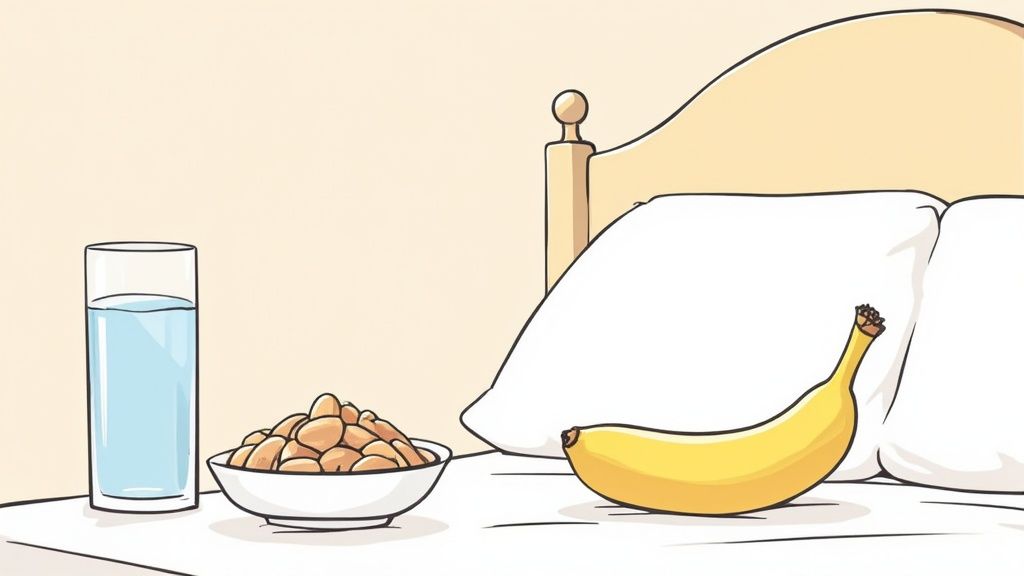
Trying to fight a bad habit with sheer willpower is a losing battle. It’s exhausting. A much smarter strategy is to replace the habit you want to break with one you actually enjoy. This is where a solid evening routine becomes your secret weapon for stopping late-night snacking. It’s a powerful signal to your brain and body that the day is officially winding down.
This isn’t about creating a rigid, joyless schedule. It's about building gentle cues that naturally shift your focus away from the pantry. When you intentionally plan your evenings, you can push those pesky cravings aside and set yourself up for a much better night's sleep. One of the best ways to do this is to learn how to craft a relaxing evening routine for better sleep, which helps quiet your mind and reduces the urge to snack out of boredom or stress.
Your evening routine is a powerful signal to your brain. It says, "The day is done, the kitchen is closed, and it's time to rest," making it much easier to avoid mindless snacking.
Build Your Wind-Down Sequence
First things first: decide on a "kitchen closed" time. For most people, 8 or 9 p.m. works well. This isn't about depriving yourself; it's about creating a mental boundary. Once that time hits, you shift your attention to non-food activities that help you truly relax.
Here are a few simple swaps that can make a huge difference:
- Instead of scrolling on your phone: Grab a book or put on a podcast. The blue light from screens can mess with your sleep hormones and, believe it or not, can even trigger hunger cues.
- Instead of watching an intense, high-stress TV show: Try some gentle stretching, spend a few minutes journaling, or take a warm bath. These activities are proven to lower cortisol, the stress hormone that often sends us running for snacks.
- Instead of a sugary drink or snack: Brew a mug of calming, caffeine-free herbal tea. Something like chamomile or peppermint feels comforting and satisfies that hand-to-mouth habit without the extra sugar and calories.
You're essentially rewiring your brain's reward system. I once worked with someone whose go-to habit was eating a whole bag of chips on the couch every night. We swapped that with 30 minutes of sketching—a hobby he'd always wanted to try. Within a couple of weeks, the destructive habit was replaced with a fulfilling one, and the desire to snack just faded into the background.
How Your Daily Meals Impact Nightly Hunger
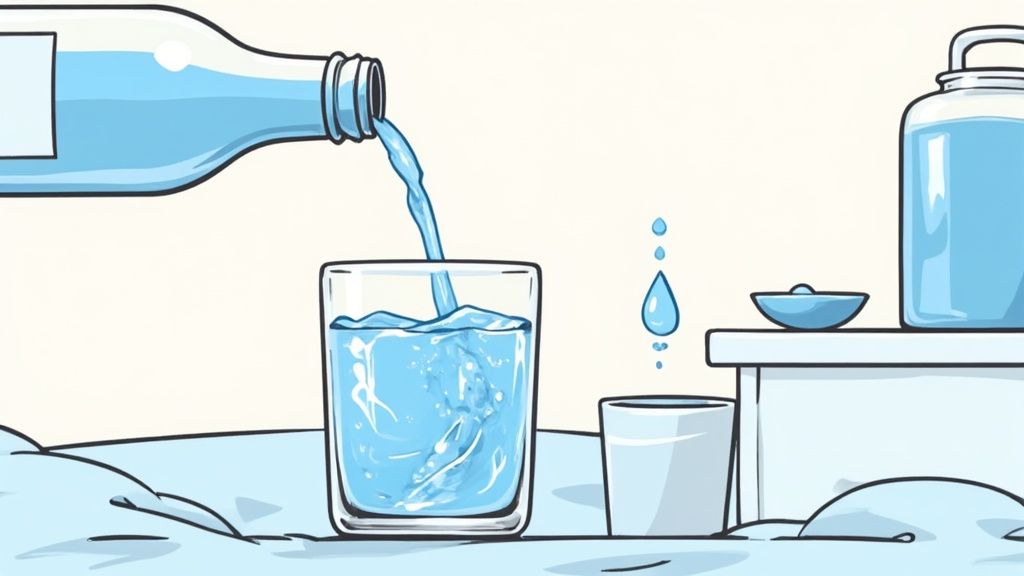
The battle against late-night snacking often isn't fought in the dark. It's won or lost hours earlier, right at your dinner table. What you eat throughout the day directly sets the stage for whether you'll be prowling the pantry at 10 PM.
If you find yourself starving after the sun goes down, take a look at what you ate earlier. Skimping on calories or essential nutrients during the day is a surefire recipe for intense, hard-to-resist cravings later on. It’s a classic trap: you restrict all day only to find your willpower has completely evaporated by evening. Your body isn't trying to sabotage you; it's just demanding the energy it was denied.
Build a Craving-Proof Dinner
Your best defense is a satisfying, balanced dinner that keeps you feeling full and stable for hours. Think of it as building a meal that's designed to shut down hunger before it starts. The goal is to combine three core components that work together to keep your blood sugar steady.
Here’s the simple formula I recommend:
- Lean Protein: This is your number one tool for feeling full. Things like grilled chicken breast, fish, tofu, or a hearty portion of beans digest slowly, keeping hunger at bay.
- High-Fiber Carbohydrates: Ditch the refined carbs like white pasta that lead to a quick crash. Instead, opt for complex carbs like a baked sweet potato, quinoa, or brown rice for slow-release, sustained energy.
- Healthy Fats: A little goes a long way. Adding some avocado, a handful of nuts, or a drizzle of olive oil really amps up the satisfaction factor of your meal.
A dinner combining lean protein, fiber, and healthy fats is your secret weapon against late-night hunger. It stabilizes your blood sugar, preventing the energy crashes that send you straight to the cookie jar.
A perfect example? Imagine a plate with a grilled salmon fillet, a side of roasted broccoli, and a scoop of quinoa. This isn't just a healthy meal; it's a strategic move that keeps you satisfied and makes it infinitely easier to stick to your "kitchen is closed" rule.
Plus, when your body is properly nourished, it rests better. Understanding how clean eating can promote better sleep can be a game-changer, as poor sleep is a major trigger for mindless snacking. Fuel your body correctly during the day, and you’ll find you have all the control you need at night.
Choose Smarter Snacks When Hunger Is Real
Let's be realistic—sometimes, you're just plain hungry at night. And that's okay. The goal isn't to starve yourself until morning; it's to make a smart choice that actually satisfies your hunger without sabotaging your health goals or wrecking your sleep.
Ignoring genuine hunger pangs often backfires. It can lead to a restless night or, worse, a much bigger binge later on. The real trick is to shift from mindless grazing straight from the bag to mindful eating. Simply putting a small, planned portion on a plate can make a world of difference in how satisfied you feel.
Make a Mindful Choice
This isn't just about willpower; it's about being intentional. It's a shift I see happening everywhere. More and more people are trading those overly indulgent, processed snacks for healthier options, especially when it comes to late-night eating.
A consistent sleep schedule, which is often easier to maintain with better evening habits, is one of the most powerful tools against late-night snacking. Just look at the difference a solid routine can make.
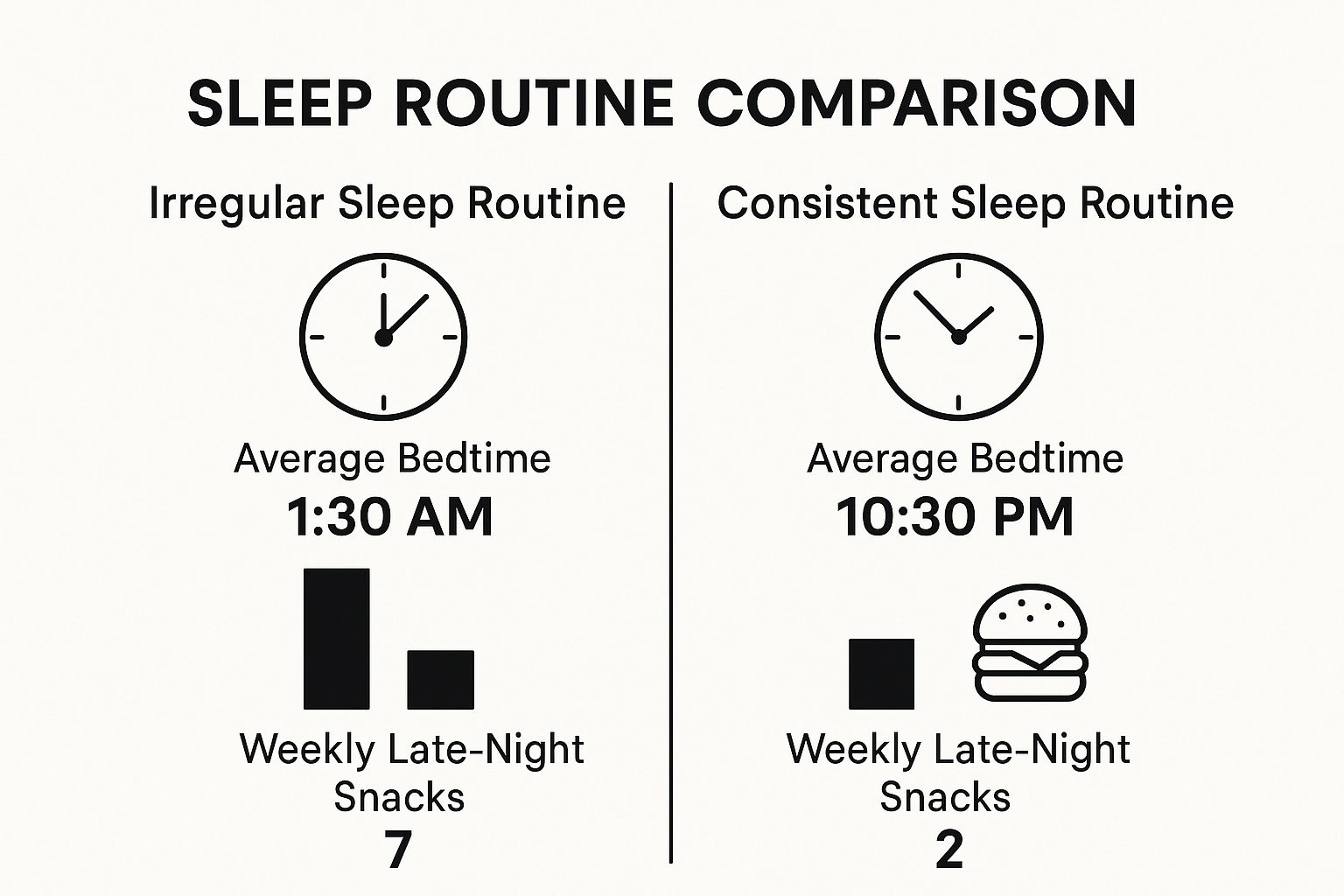
As the numbers show, a stable routine can slash weekly snacking episodes. It’s clear that having a good structure in place is far more effective than trying to fight cravings with sheer willpower alone.
Healthy Swaps for Common Late Night Cravings
Having a game plan is crucial. When a craving hits, knowing exactly what healthy alternative you can reach for makes it so much easier to stay on track. If sugar is your main nemesis after dinner, you're not alone. We've put together a comprehensive resource on how to stop sugar cravings at night that can help.
To get you started, here's a quick guide to swapping out some of the most common late-night snacks for something better.
Healthy Swaps for Common Late Night Cravings
This table is your quick-reference guide to trade common unhealthy snacks for better options that satisfy your cravings and support your goals.
| If You Crave This... | Try This Instead... | Why It's a Better Choice |
|---|---|---|
| A Bag of Potato Chips | A handful of walnuts or almonds. | They provide healthy fats and protein to keep you full, without the empty carbs and sodium. |
| A Bowl of Sugary Cereal | A small bowl of Greek yogurt with berries. | You get a great balance of protein and fiber, which helps stabilize blood sugar, not spike it. |
| Cookies or Candy | A few squares of dark chocolate (70% cacao or higher). | This satisfies your sweet tooth with antioxidants and less sugar, avoiding that energy crash. |
Having these simple swaps in your back pocket makes it much easier to make a choice you’ll feel good about in the morning.
Master the Mindset for Lasting Change
https://www.youtube.com/embed/i6_NaNW7XZA
If you want to stop late-night snacking for good, the real work isn't about willpower or creating a list of forbidden foods. It's all in your head. Lasting change comes from a resilient mindset, not a perfect diet plan. Your internal dialogue—that voice in your head—has a massive impact on your actions, especially when a craving feels like it's taking over.
The best part? You can train your mind just like any other muscle. This isn't about restriction; it's about empowerment. It’s about realizing you’re in the driver's seat, not the fleeting urge for a bag of chips.
Learn to Surf the Urge
One of the most effective mindfulness tricks I’ve learned is called "urge surfing." Think about it: when you try to fight a craving head-on, it usually just gets stronger, right? Instead of fighting, you just notice it.
Imagine the craving is a wave. It builds, it crests, and then… it passes. All on its own. Your job isn't to stop the wave, but to ride it out until it flattens.
The goal isn't to never feel a craving again. The goal is to realize you don't have to act on it. Acknowledging the urge and letting it go is a skill that builds strength over time.
This simple technique creates a little bit of space between the feeling and your reaction. You're not ignoring the craving; you're just watching it from a distance until it loses its grip on you.
Embrace Self-Compassion and Positive Self-Talk
So, you slipped up. Last night, you found yourself at the bottom of a pint of ice cream. It happens. That doesn't mean you've failed or that all your hard work is down the drain. Beating yourself up just fuels a cycle of guilt and shame, which, ironically, often leads to more emotional eating.
Instead, try being a little kinder to yourself. Acknowledge what happened, get curious about what might have triggered it, and then simply move on. This is a journey of progress, not perfection. A huge piece of this is reframing how you talk to yourself.
- Instead of: "I can't have that." (This just makes you want it more.)
- Try: "I'm choosing not to have that right now because I want to feel great tomorrow." (This puts you in control and connects your choice to a positive outcome.)
These small shifts in language are more powerful than you think. In the U.S., where late-night snacking is common, many of us are reaching for snacks for emotional comfort. By mastering your mindset, you can learn to provide that comfort for yourself without needing the food. If you're curious about the data behind snacking trends, check out this detailed report.
Ultimately, transforming your mindset is the most critical part of learning how to break bad eating habits and turning a short-term fix into a lifestyle that actually lasts.
Answering Your Questions About Late-Night Snacking
When you're trying to break the late-night snacking habit, a few questions always seem to pop up. Let's get them answered so you can move forward with confidence.
Did I Just Ruin Everything with One Late-Night Snack?
Absolutely not. We’re aiming for consistency, not perfection. One night of snacking won’t undo weeks of good habits. It’s a bump in the road, not a total derailment.
The best thing you can do is treat it as a learning moment. Ask yourself what triggered it, make a note, and get right back to your routine the next day. No guilt allowed.
Don't let a single slip-up convince you it's over. The most powerful move you can make is to get right back on track with your very next meal.
Is It Ever Actually Okay to Eat Before Bed?
Yes, but only if you're truly hungry. Trying to sleep with your stomach growling can be just as bad for your rest as feeling uncomfortably full. The trick is to be mindful about it.
If you’re genuinely hungry, a small, light snack is perfectly fine. Think of things that are easy to digest, like:
- A small banana
- A handful of almonds
- A small cup of Greek yogurt
Just stay away from anything heavy, sugary, or greasy. Those are the snacks that mess with your sleep and make you feel groggy the next morning.
How Long Does It Take for the Cravings to Go Away?
This is different for everyone, but most people start to feel a real shift in about two to three weeks. You just have to get through the first few days, which are almost always the toughest.
Once your body gets used to being properly fueled during the day and you have a solid evening routine in place, those intense cravings will start to fade. They become quieter and much easier to ignore. Stick with it, and your body will catch on.